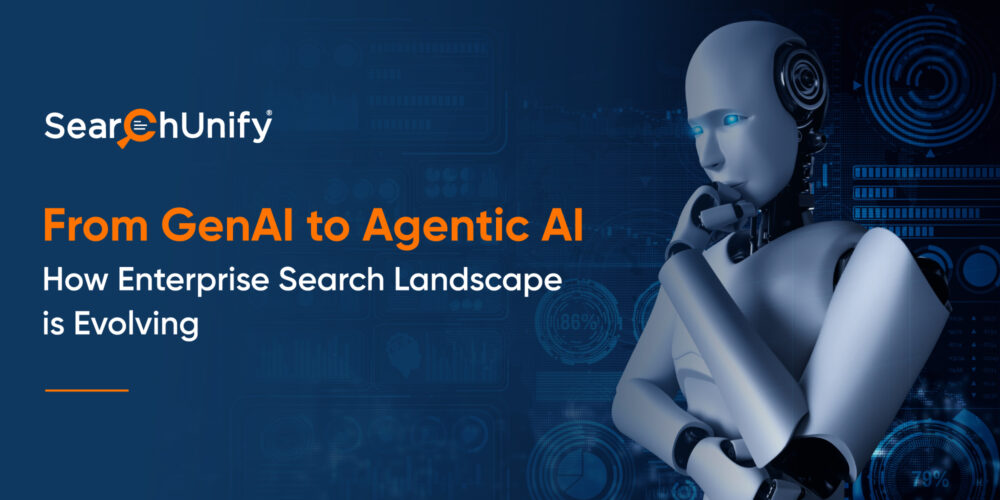
Agentic AI is the latest technological advancement, ready to take the enterprise search landscape to an unprecedented level. Ever wondered why agentic AI? Because GenAI is significantly transforming the search landscape through enhanced information retrieval and content creation.
The answer lies here—30% of GenAI projects will fail after proof of concept by the end of 2025. GenAI lacks autonomy and the ability to act independently on the users’ behalf. And agentic AI is the next evolution beyond GenAI.
Curious to know more? This blog explains why GenAI isn’t the whole solution and requires agentic AI, its use cases in enterprise search, which might help you make informed decisions for your business.
Why GenAI Alone Isn’t Enough: The Rise of Agentic AI
While GenAI offers substantial advantages such as enhanced content creation and information retrieval, there are specific scenarios where it’s not enough and needs an intelligent agentic AI layer.
Lack of Complex Reasoning: GenAI often struggles to perform complex reasoning tasks. Because completing such tasks requires deep contextual understanding, in-depth insights, and multi-step problem-solving, but unfortunately, GenAI lacks the same.
Here comes Agentic AI, addressing this problem effortlessly. Agentic AI’s autonomy capabilities enable it to perform complex reasoning and other tasks that require decision-making. For enterprise search, agentic AI handles multi-layered queries effectively through deep analysis, enhancing response quality by delivering contextually relevant and accurate answers.
Inadequate Risk Controls: The unpredictable nature of GenAI poses compelling risk management challenges. Enterprises hold massive amounts of sensitive and confidential data, which might be unintentionally disclosed while searching, leading to potential data breaches. These inadequate risk controls make relying on GenAI entirely for their enterprise search challenging.
With Agentic AI emergence, this obstacle can be turned into an opportunity. Agentic AI is objective-oriented, allowing robust risk management control integration. For instance, sensitive information access restrictions and regular data usage monitoring prevent unauthorized access or accidental information disclosure.
Your Competitors Are Adopting Agentic AI—Are You?
Let’s DiscussAdditionally, agentic AI can be programmed with rigorous compliance protocols, ensuring it adheres to corporate standards, regulations, and privacy policies, making it a more unassailable solution for enterprises.
Lacks Autonomy in Decision-Making: GenAI excels at generating creative outputs like text, images, or code but operates strictly within predefined prompts. It lacks the ability to interpret dynamic contexts or make decisions, limiting its role to being a passive tool rather than an active problem-solver.
Agentic AI’s advent bridges the gap by bringing autonomy and adaptability to the table. It goes beyond generation, taking action, learning from outcomes, and making decisions in real-time to achieve complex goals without requiring constant human oversight.
Unleashing the Power of Agentic AI: Enterprise Search Use Cases
Agentic AI is a groundbreaking technology poised to revolutionize the enterprise search landscape by empowering systems with autonomous decision-making power. Here are some key uses that you can’t afford to miss.
Proactive Information Delivery
This intelligent AI analyzes user behavior, history, and real-time context to anticipate users’ needs. Moreover, it starts proactively recommending relevant information without even initiating a search by users.
Additionally, agentic AI deciphers users’ preferences and patterns and delivers personalized search results to each user. It increases the chances of finding the most relevant and valuable information.
Autonomous Query Refinement
Suppose the user query is ambiguous; how will agentic AI help here? Agentic AI can autonomously refine or suggest alternative search terms and correct misspellings based on historical data, previous query and real-time context to improve search results accuracy.
Intelligent Search for Complex Queries
With natural language understanding, agentic AI can understand the intent and context of complex, ambiguous, or even open-ended search queries. It eliminates the need for exact keyword matching, delivering more accurate and relevant results.
This advanced language capability of agentic AI enables a more natural and intuitive way of intuitive AI-human interactions. It fosters new opportunities for collaboration and problem-solving.
Autonomous Task Completion
Suppose a customer searched for “unable to connect my smartwatch with mobile” but was not satisfied with the results and asked, “not working for me, feeling frustrated.”
Agentic AI will do proactive situation analysis and understand the sentiment behind the query that the user is frustrated and needs a solution. In such a scenario, agentic AI will take action and either connect you directly with live support agents or create a case for you.
It makes customers feel valued. Not only this, but you want to know your case progress, add a query, and get an update without shifting to a different platform.
Improved User Experience
What do all users crave? Exceptional user experience, right? With agentic AI, it’s possible to offer intuitive and personalized search interfaces that cater to every user’s needs, whether agents or customers.
In addition, by optimizing the search process, agentic AI enhances support agents’ productivity, quickly delivering relevant and accurate information and increasing the resolution rate.
Reimagining Search: The Transformative Power of Agentic AI
The enterprise shift to agentic AI is a significant step towards addressing the GenAI limitations. From enhancing search accuracy and autonomous task completion to performing complex reasoning tasks and improving user experience through intuitive and personalized, agentic AI disrupts the search landscape at breakneck speed.
Agentic AI adoption is not just an upgrade but a strategic step for advanced, secure, and more effective information retrieval to enhance the self-service success rate and user experience.